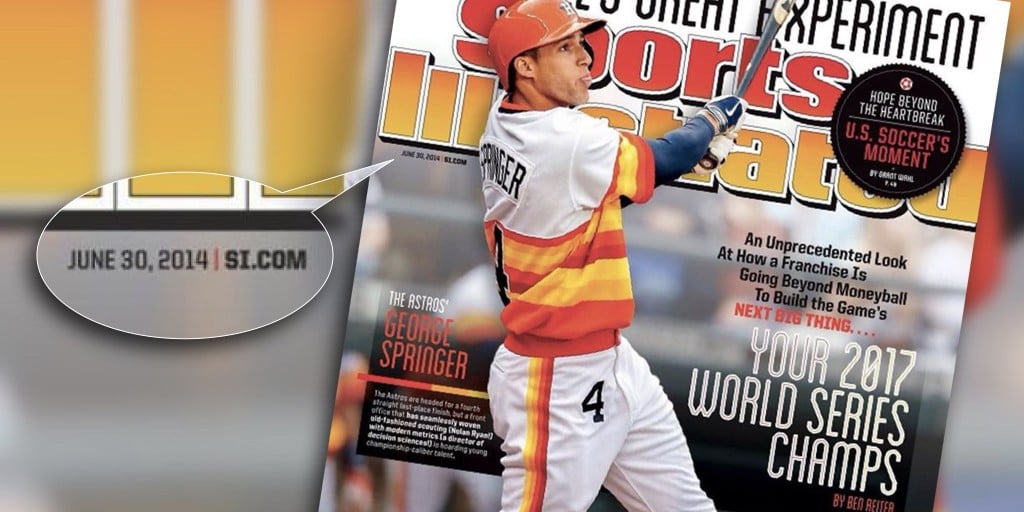Houston Astros’ World Series win is also a win for predictive data

Congratulations to the Houston Astros! Your “Grand Experiment” paid off! Your vision for the future put you in a place to win the first “All Computer World Series”, and you did it! Your commitment to predictive data has been rewarded.
Baseball has a paradoxical history. Its fans have a deep love for data, especially numbers, while simultaneously holding each other accountable to a rich tradition of superstition. As the season began, each time the Mariners reached .500 I celebrated with a social post, that is, until my friends pointed out my actions were “causing” a 4 or 5 game losing streak. I ceased, but alas, the World Series drought for Seattle continues.
No team has ever so committed themselves to superstition by employing the strategy of Angels in the Outfield, at least not publicly. Every team, however, has been forced to consider the data driven strategies of the 2002 Oakland A’s as chronicled in the book Moneyball by Michael Lewis. It can even be argued, as the film version of Moneyball seemed to imply, that the Boston Red Sox broke the “Curse of the Bambino” 2 years later, not with superstitious countermeasures but with predictive data.
How have the Astros taken predictive data to the next level? According to the original Sports Illustrated article from 2014, they not only used strategies presented in Moneyball by Michael Lewis, but began augmenting that data set by including softer data points such as a player’s injury probability, personality, family history, and more. Then they compared prospective players with a machine learning data model built from a history of baseball prospects since 1997. In other words, they have been using past and current player data and player outcomes to predict the future of player success. How fast did they see the results of their strategy? FiveThirtyEight ranked the 2012 Astros as “one of the worst teams ever” but describes their rate of improvement as something “a team only manages about once in every thousand chances in MLB history.”
The Astros did not stop there. Their predictive engine, informed by knowing where all current hitters in the league have hit the ball in specific batting situations, also predicts the best defensive positioning to increase the probability of being exactly where the hitter will hit the ball. For example, a defensive shift last September against Albert Pujols that left one infielder on the right side of the infield garnered attention around the web.
In retrospect, did fans embrace the journey toward a data driven championship? Business Insider recently reminded us of anecdotal Twitter evidence that Houston’s long term commitment to data invited doubters and haters. Even the Houston Chronicle tapered their desire to trust the predictive data. The commitment to data left many questions early, but the results are obvious now.
While the bandwagon had plenty of room in 2017, fans lacking trust in the data in 2014 missed out on the longer more glorious journey to the championship.Like baseball, the realm of HR has been long overdue for data informed decision making, and Textio is leading the way in making that change. By putting their trust in Textio’s data, our customers have achieved hiring success:
- Broadridge doubled qualified applicants to their roles
- Vodafone saw a 17% faster time to fill for open roles
- Johnson & Johnson saw a 9% lift in women applying to open roles
Not too long after the Sports Illustrated cover came out, Textio was founded and ushered in the era of augmented writing, writing informed by data to predict results related to audience response. With a data set of over 300 million job descriptions and outcomes, and 10 million more being added each month, Textio’s predictive engine is helping our customers see, on average, a 25% increase in qualified candidates, 23% more women apply, and a 17% faster time to fill.
Textio’s predictive engine is constantly learning from job posts and surfacing the language patterns that are working right now. Not three months ago. Today. Some of the recent patterns Textio uncovered:
- Jargon isn’t just dreaded, it also is dreadful for job posts. Words like overachiever and value-add slow down hiring 3.6x and 2.6x respectively.
- Jobs in Seattle fill faster today if you use the words data-driven, but the word analytical will slow down hiring.
- The most in demand skills on Wall Street might not be what you expect. Surprisingly, soft skills are on the rise: words like listening skills, and help clients help finance roles fill faster.
Houston’s trust in predictive data helped them win their first championship. Your trust in predictive data will help you win talent. Now that’s something worth rooting for.